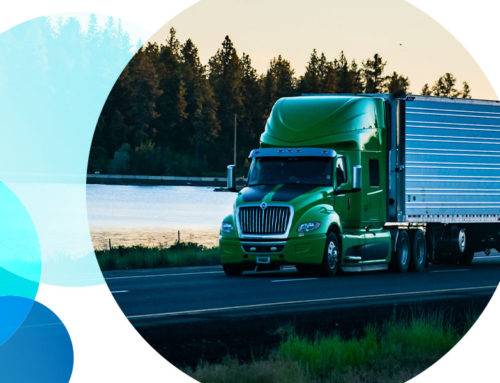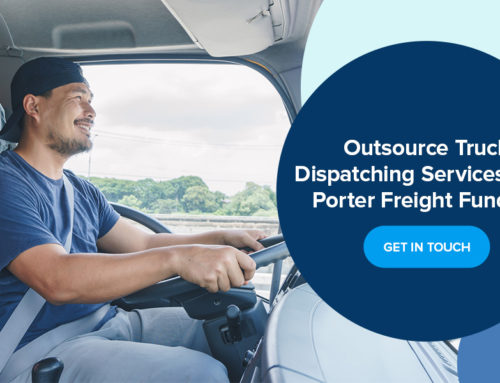What is trucker insurance, and what coverage can you get? Is commercial trucking insurance even necessary? If yes, what are the essential considerations before buying a truck insurance policy?
Jump To Section
Though trucking companies invest time and effort to reduce risks, they still lose thousands of dollars in accidents annually. Trucking insurance gives truckers the peace of mind to conduct their business without worrying about the unknown.
What Is Commercial Trucking Insurance?
Commercial trucking insurance coverage protects drivers and trucking companies against financial losses. Like any other insurance coverage, the trucker pays premiums depending on the policy they purchase, and the insurance provider pays for expenses that arise due to damage and loss. The level of coverage varies depending on the agreement between the insurer and the policyholder.
At minimum, commercial driver’s license holders must have basic coverage to protect them in an accident. However, you may get a more extensive policy depending on your needs. Assess your requirements and financial situation and choose an insurer and coverage that serves you best.
Trucking companies need insurance policies to shield their futures because it’s impossible to predict when accidents will occur and how much damage they will cause.
Trucking Company Insurance Requirements
The Federal Motor Carrier Safety Administration requires trucking companies to have insurance coverage for their vehicles. The CDL insurance requirements are straightforward, but you should strictly comply with them to avoid fines and penalties.
Truck drivers need an active CDL to operate the vehicle. You earn your CDL after passing a series of exams. Then, you must purchase insurance coverage, a prerequisite to getting operating authority. The coverage must meet FMSCA’s minimum limits depending on the type of freight you haul.
Besides the federal regulations, learn if your state’s laws have additional requirements. Commercial truck insurance requirements are mostly consistent nationwide, but you should still double-check.
Why Do You Need Truck Insurance Coverage?
Trucking insurance shields you against unexpected financial losses, with protection that reduces stress. Liability insurance is also a legal requirement for your fleet.
Since eliminating risks is impossible, trucking business owners invest resources to reduce them. Therefore, it’s wise to prepare for unpredictable events that can cost your business significantly. Some companies fail to recover from accidents because they cannot manage the resulting financial strain. However, a comprehensive insurance policy should cover surprise expenses.
Trucking Insurance Coverage Options
Different types of trucking insurance coverage offer unique protection. Here are five examples.
1. General Liability Insurance
All businesses can benefit from general liability insurance, and trucking companies are no exception. General liability insurance for trucking companies covers property damage, bodily harm and associated expenses when one of your drivers causes an accident. This broad coverage may include legal fees, medical bills and property repair or replacement.
You may also negotiate with the insurer and purchase additional coverage for unrelated perils like slips and falls, wrong delivery, copyright infringement and contractual exposures. Carefully review the contract to understand everything it covers.
2. Non-Trucking Liability Insurance
Non-trucking liability insurance protects your business when a driver uses the truck outside business hours. For example, your employees may drive their trucks to run errands, so you may need coverage for those non-work-related trips. Non-trucking liability insurance may not cover the goods, but it can reduce liability expenses in an accident. For example, it can cover the third party’s medical bills and legal fees if they sue.
3. Bobtail Insurance
Bobtail insurance protects you when a driver uses an 18-wheeler without an attached trailer. It covers you when the truck has no load. For example, if a driver drops off a load in one city and bobtails to another to pick up new cargo, the insurance will cover that portion of the trip.
The coverage may also apply when a driver drives the truck home after dropping off a load. While bobtail insurance does not typically cover damages to your rig, it may cater to medical bills and legal expenses. It may also cover damages caused to a third party’s property.
4. Hauling Insurance
Truckers earn money by transporting other people’s goods. Since their cargo can cost thousands of dollars, loss, damage and theft can be costly. Even if you transport items for free, you must still ensure they arrive safely.
Insurance covers transported goods. You can file a claim if anything gets lost, damaged or stolen in transit. Cargo insurance is necessary for all trucking businesses, especially those that carry high-value items.
5. Physical Damage Coverage
Auto accidents typically result in physical damage to the vehicle, which can be costly to repair or replace. Since other policies may only take care of the third party’s vehicle, purchasing liability coverage for your truck is an excellent idea.
Physical damage insurance pays for the repairs or replacement cost when your truck gets involved in an accident. It may also cover damages caused by natural disasters or vandalism. Depending on the extent of your coverage, the insurer may also replace a stolen truck.
What Should You Consider When Purchasing Trucking Insurance?
Here are three essential considerations when purchasing commercial trucking insurance.
1. Your Business Needs
Assess your business needs and determine which policy is best for you. Prioritize the challenges you are most likely to face because of the nature of your operations. List the potential dangers and arrange them from high risk to low.
In some cases, federal or state law will determine which coverage you purchase based on the cargo you transport. For example, you may need additional primary liability coverage if you transport hazardous materials like flammable gas.
2. The Terms of Your Coverage
The insurance terms generally determine your rights and liabilities. Your contract provides information about the covered perils and how much you can claim. It also states how much you pay in premiums and your payment method. Read and understand the agreement before you sign. You can renegotiate with your insurance provider if the terms are unfavorable.
3. The Insurance Provider
The insurance company you partner with impacts your growth significantly, so choose carefully. Select a provider with experience in the trucking industry and an excellent reputation. Customer relations is another vital consideration.
Do thorough research and seek recommendations from people you trust before contacting the insurance provider. You can also consult other businesses with knowledge and relationships with reliable insurance providers for referrals.
Let Porter Freight Funding Connect You With Trusted Insurers
Porter Freight Funding is a trusted factoring company with years of experience in the trucking industry. We understand trucking companies’ challenges and strive to offer solutions that help them grow.
We help trucking companies find the right insurance providers depending on their needs. Get the best insurance quotes by working with us. Contact us now at 205.397.0934 to speak to an insurance specialist.



